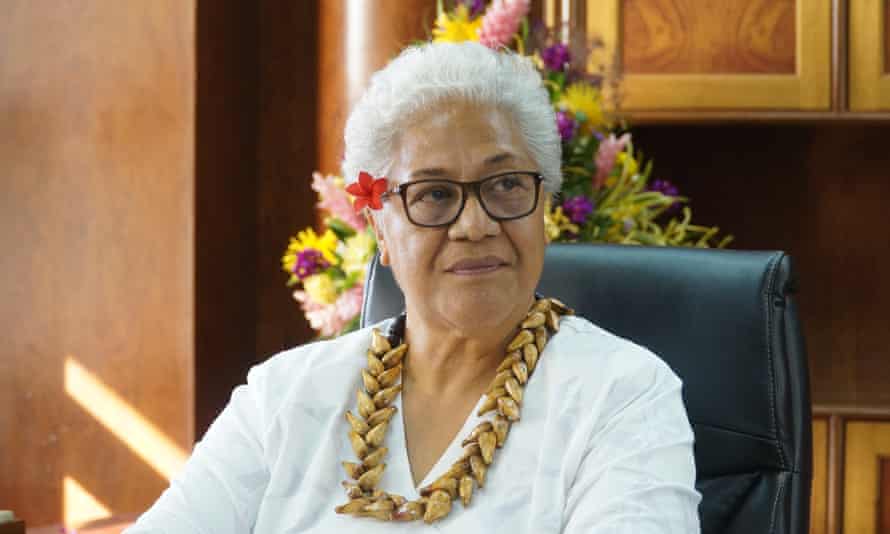Australia must increase 2030 emissions target to help avoid ‘catastrophic’ heating, Samoan PM says
Fiame Naomi Mata’afa says Australia needs to come ‘come back to climate financing table’ at Cop26

Australia needs to increase the ambition of its 2030 emissions reduction target and “come back to the climate financing table” at the looming Cop26 talks in Glasgow, according to the prime minister of Samoa.
As Scott Morrison persists with efforts to persuade the Nationals to accept a mid-century net zero emissions reduction target, the Samoan prime minister, Fiame Naomi Mata’afa, issued a stark public warning on Wednesday.
Fiame declared the looming United Nations-led climate conference in Glasgow “could be the point of no return” when it comes to leaders preventing runaway global heating.
She said recent pledges for increased ambition by a number of countries were welcome but “the emissions gap is worrisome and still puts us on a catastrophic pathway of about 2C of global heating”.
“All major emitters need to urgently commit to strong climate action,” Fiame told a webinar hosted by progressive thinktank the Australia Institute.
“We need to push for cutting emissions in half by 2030 to help reach carbon neutrality by mid-century.”
Asked whether that meant Australia should update its 2030 emissions reduction target – which is currently a cut of between 26 and 28% on 2005 levels – the Samoan prime minister replied: “Of course.”
“We would like Australia to do that,” Fiame said. “I don’t have an exact number or level of reduction that we would ask with the Australians.”
She said Morrison would “not like me for giving these answers but this is not new to him – the Pacific position has always been very clear”.
The Samoan prime minister said international climate financing was another area where Australia could step up. “Financing is one of the building blocks of the negotiations we are having through the UN,” she said.
Australia agreed under the Abbott government to support the UN-backed Green Climate Fund, but Morrison changed that position in 2018. Australia persisted with providing climate finance but delivered it through bilateral partnerships in the Pacific. Pacific nations are strong supporters of the UN-led fund.
Fiame said on Wednesday: “We are not meeting the financial targets that have been set. I think that is one of the burning questions – how do we meet that gap?”
She said “we all know Australia’s situation, their position regarding climate change” but Fiame argued if Morrison could bring Australia “back to the climate financing table – that would be a good start”.
The Samoan prime minister’s appeal was echoed by Frank Bainimarama, the prime minister of Fiji, at a separate forum on Wednesday. “Everything we fought for at the Paris Agreement, the 1.5C target, affordable and accessible climate finance, the very survival of our reefs, islands and way of life is on the line in Glasgow,” Bainimarama said.
“Yet we know there are leaders who hope to sneak in and out of Glasgow without making a single serious commitment that will save our planet for coming generations. We cannot let them. I want the children of the Pacific to be the poster children for development, not disasters”.
The calls for action come as Morrison is attempting to land an agreement within his government for Australia to adopt a commitment to net zero emissions by 2050. Internal negotiations will enter the business end next week.
Liberal MPs in metropolitan seats are pushing for both a net zero by 2050 target and a roadmap to reach it that would outline shorter-term milestones. But they face resistance from Nationals MPs, mostly from Queensland, who are firmly against the net zero target.
Morrison has also been signalling he may not attend the Glasgow summit next month. On Tuesday, Australia’s prime minister said his “first responsibility” was to explain any new climate commitments “to Australians not to people overseas at overseas conferences”.
The UK’s high commissioner to Australia, Vicki Treadell, has said the UK would be “very disappointed” if Morrison did not attend the summit.
On Wednesday Treadell strengthened her long-standing calls for Australia to increase its medium-term emission reduction pledges, noting that many countries were “coming up with a revised interim target of between 40 and 50%” by 2030.
“No movement would not be acceptable – we would find that disappointing,” Treadell told SBS News.
Fiame said it was up to Morrison whether or not he attended the summit. The Samoan prime minister said she wanted to go but “we ourselves are finding it very difficult to make our way to Glasgow and even more challenging on the way back”.
She said it was important for Pacific leaders to have a significant presence in Glasgow. “We sincerely hope that the hosts entertain virtual participation in the workings of the Cop26.”
Given the extent of the substantive disagreement between Samoa and Australia about the need for urgent climate action, Fiame was asked whether diplomatic relations were at risk. She said that was not the case.
“In any relationship, there are things that you agree on and things you don’t agree on,” Samoa’s prime minister said. “You carry on with what you agree on and continue the dialogue and negotiate on issues that still need work.”
Fiame called on the leaders of the world not to squander the opportunity for action at Glasgow. “We must continue to push and demand more ambitious climate action from everyone,” she said.
The coronavirus pandemic must not be used as an excuse to defer action, she said.
“The development of Covid-19 vaccines was the fastest in history,” the prime minister said.
“The rollout around the world at large scale required a massive, global, coordinated effort. I often ponder on how we can push for this historical, united, urgent global response at the same massive scale to help us reach the 1.5C promise of the Paris agreement.”